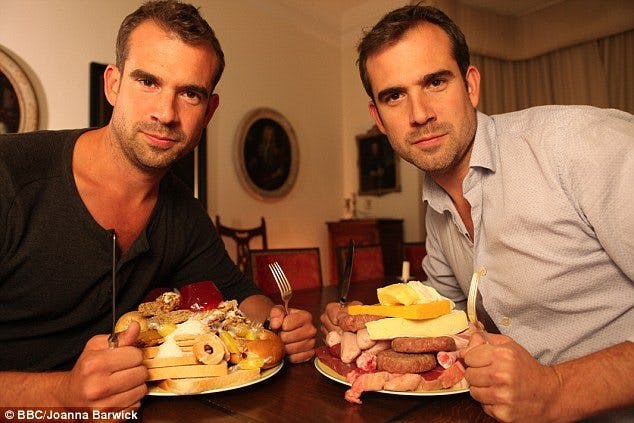Sugar vs fat on BBC: which is worse?

Sugar or fat, which is worse? That’s the question in the BBC documentary “Sugar vs. Fat” that aired the other night. And it’s been a long time since I got so many e-mails asking me for comments!
It’s an interesting setup. Two identical twin brothers – both of them doctors – go on a diet for a month. One on an extreme low fat diet, one on an extreme low carb diet (not even vegetables are allowed!). Here’s some background information:
MailOnline: One twin gave up sugar, the other gave up fat. Their experiment could change YOUR life
You can watch the show online here.
Unfortunately they end up mostly “confirming” their preconceived ideas. Ready? Here comes the spoilers:
Result
Obviously when there is only one person on each diet, chance plays a big role. But I think the findings were more or less what could be expected, it’s mostly the ignorant (or TV-drama) explanations I have objections to.
Weight
First thing first. Even though both brothers were at a fairly decent weight to start with, the low-carb brother lost the most weight: 4 kg (9 pounds) vs only 1 kg (2 pounds) for the low-fat brother.
As study after study show more effective weight loss on a low-carb diet, this should be no surprise. The loss of fat was 1,5 kg on low-carb (a good result in a month) and 0,5 kg on low-fat. Most of the rest was probably fluid. On a very strict low-carb diet you quickly lose a kilo or two of glycogen and water weight.
How much – if any – muscle mass the participants lost is impossible to know as the BodPod test only measures fat mass vs. non-fat mass (including water).
Brain function
For testing the brain function of the brothers the producers chose to make them do stock trading with fake money.
This shows that the producer is ignorant or just interested in a dramatic show. Why? Because short-term stock trading – without insider info or other illegal tricks – is a game of pure chance. It’s been convincingly shown that a trained monkey has a 50% chance of beating a well-educated stock broker. Why? Because it’s all chance.
In other words this test is rubbish, but the low-fat brother wins.
More interesting and relevant is that the low-carb brother complains of feeling “thick-headed”. I’m sure he’s honest. Going on an extreme low-carb diet – without even vegetables – can absolutely result in problems concentrating etc. for a week or even more, before the body and brain adapts to burning fat and ketones.
This problem can often be partially avoided by increasing the intake of fluid and salt. And after a week or two it’s normally gone.
Exercise
For testing their exercise capacity the brothers do “long sessions of uphill cycling”. The low-carb brother predictably loses badly.
Why? Two things: the body needs weeks or sometimes even months to adapt to high-intensity exercise, using mostly fat and ketones. And even then you might need a little bit of carbs for explosive and anaerobic sports like this.
I’ve interviewed Dr Peter Attia who successfully races his bicycle for hours on a very low-carb diet. Even he uses a little bit of slow-release starch for maximum performance on his long training sessions:
YouTube: Very Low Carb Performance
Diabetes
Finally the icing on the (diabetes) cake. The doctor claims that the low-carb brother has become “almost” pre-diabetic by eating low-carb! The word “almost” should actually be interpreted as “not”. I wonder if the doctor knows the first thing about low-carb and diabetes. In fact I wonder how much he knows about diabetes at all.
The low-carb brother has a fasting glucose of 5,1 before the diet (normal) and a fasting glucose of 5,9 after the diet (normal). Did you catch the word “normal” twice? Yes, thats right, a fasting glucose of up to 6,0 mmol/L is considered normal, at least in Sweden. It also varies significantly from day to day. If we tested the doctors’s own fasting blood glucose it might be 5,9 today and 5,1 tomorrow.
The result could be due to chance but sometimes the fasting glucose level actually gets slightly higher on an LCHF diet, while the glucose levels during the day (after meals) is way lower. This is probably because the body is adapted to burning fat and so the need for burning glucose when fasting is lower. Thus you don’t get the same fasting “dip” in sugar levels.
They also did glucose tolerance tests – a much more relevant test. But the result of the low-carb brother is never mentioned. I guess it was normal.
The fact that diabetes is effectively treated with a low-carb diet should tell us everything we need to know. You don’t get type 2 diabetes by eating a diet that can cure diabetes. And you certainly don’t get type 2 diabetes (strongly correlated to obesity) by losing 4 kilos of excess weight in a month.
Summary
The documentary concludes that it’s not about fat or sugar, it’s about avoiding processed food with both fat and sugar in it. I’m sure that strategy would work fine for these two fairly fit brothers. It’s an excellent start. But it’s not enough for everybody.
In people with obesity and diabetes studies convincingly show that low-carb diets are more effective.
Finally, while a super-strict low-carb diet is not necessary for everyone and has possible side-effects (especially during the first week or two) it certainly do not result in diabetes. That’s just ignorant.
What did you think about the documentary?
More
Diabetes – How to Normalize Your Blood Sugar
New Study: A Low-Carb Diet and Intermittent Fasting Beneficial for Diabetics!
Football Champions on a Low-Carb Diet
Swedish Expert Committee: A Low-Carb Diet Most Effective for Weight Loss